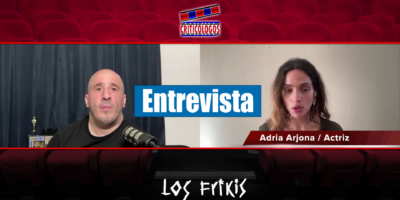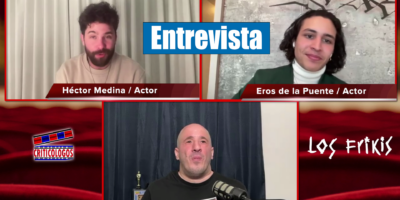Interview by Rafy Mediavilla, w/ Daniel Farrands / Writer & Director of the movie “Ted Bundy: American Boogeyman”. Out Today On VOD & DVD.
Criticólogos:
What is it about Ted Bundy that that makes him such a subject matter to make so many different projects about him?
Daniel Farrands:
Honestly, I think it’s the fact that he personifies evil. You know, I think we’re endlessly fascinated by evil doers, evil minds, and I think he represented. You know, very similar to the title of the film, he was that American Boogeyman of my childhood that I remember, you know, wreaking havoc and terror across the Tre country and the things that he did were so unspeakable that, you know, I, I don’t think he’ll ever be forgotten for that reason.
Certainly I don’t mean to celebrate, and I have no intention or any idea in my mind that he’s somebody that we should hold up and Revere him or, you know, make him into be anything other than the truly heinous monster that he was.
Criticólogos:
Something that I really loved about the movie is that you I think you guys did amazing job in recreating those times. That production side is so always, you know, the production design is It’s difficult to be able to transport the viewer into those specific time was there something specifically that you remember that you found really difficult in order to recreate that stood out?
Daniel Farrands:
Yeah, I mean it’s hugely important. I mean, it’s really difficult n 2020 when we made this movie we were by the way, we’re the first independent movie to be greenlit by the Screen Actors Guild and the Directors Guild to even go into production. At the time, I mean, we were so at the beginning of COVID and not really knowing how to work. And filmmaking is so collaborative and so kind of Labor intensive, you know we’re all kind of trampling over each other, trying to get things done. Sort of work in these new zones and these kind of bubbles that the unions helped create and we were the first ones to sort of step out and do that.
So that was number one, a big challenge, but number two, yeah, it’s to create on a limited time, you know, with the budget that we have. I’m scared we had to transport the audience back to 1974 to 1978. Very difficult, but we were very fortunate and that we found a location in Pomona, CA which was kind of like an abandoned shut down quadrant of an old college campus and the majority of the film was shot on that location, so and it had that very kind of old style buildings and the everything felt very like we were transported back to that time. You know there was the architecture kind of Lent itself to it. Not that we didn’t do a lot of production design work, and we had a great art department to bring in all of the props and things. And then certainly the costumes that’s always you know part of ours certainly, but yeah, I think it was really the challenge was making a movie at the height of the COVID. Really not easy.
Criticólogos:
With what was said about all these cases about Ted Bundy, what was it about the sorority case that you felt that you needed to focus on it?
Daniel Farrands:
I mean it is where he lost control completely. You know, prior to that he had been almost like an organized killer. He planned it out. He stalked these. You know, like it was a one by one by one thing and he would found to sort of cover his tracks. In Florida, he it’s like he lost control of all of that and then one heinous horrific night went from room to room in this in this sorority house, because unwitting girls were sleeping. And brutalized them murdered. And it’s just so heart wrenching to me, you know. And I, you know, I didn’t pull away from those violent acts, I don’t really focus on it. Very almost ethereal like this is, I wanted to distance the audience a little bit from the violence because I just think if to show that in graphic detail is difficult to do and its just not the movie I wanted to make.You know, I wanted to show the viciousness of his crimes, but I didn’t want to linger on that too much. It was really more of a story of the law enforcement, the people who worked so hard to track this man down. Against all odds, they didn’t have technology the way we do today, to assist them. But yeah, I think that that sorority house massacre we’ll call it was the end of the road for him. But it was extremely, it was just it was, It was the part of the story that I feel like needed to be told.
Criticólogos:
Let’s talk about cast, Chad Michael Murray, Holland Roden, & Lin Shaye, how did that came about? What did Chad think when he was presented with the idea, Hey, do you want to do Ted Bundy, understanding that many people already done Ted Bundy. And he’s obviously somebody that you know, it’s difficult to recreate, So what we chat and in the How did the cast reacted to the story?
Daniel Farrands:
Chad got the script and read it and called me right away because he was really taken with the fact that I didn’t glamorize Ted Bundy. I didn’t make him out to be this great guy who might be a little wet misunderstood. Maybe he wasn’t so bad after all, that’s not the story I had on the page, and certainly not the one that I intended to tell, I think. He understood the the dark side of it all and Chad’s just the opposite, that he’s like a warm hearted family, he loves his kids and his wife and he lives very, you know, kind of like a man of on the land almost. You know he’s very outdoorsy and but I think he understood what we were trying to say with this film. Which was, you know, that Ted Bundy was a monstrous being, and I wasn’t making any excuses for him and I think he appreciated. But I was drawn to Chad because of his performance in Riverdale as this kind of bizarre cult leader, and also the fact that he had been in Freaky Friday many years ago. The remake with Jamie Lee Curtis and Mark Heart laid was also in Freaky Friday, who played Ted Bundy in the very first TV movie, deliberate Stranger Up. So I maybe that connected in my head as well.
But then Lin Shaye was just like an obvious choice to me. Uhm, she just brings so much gravitas and reality to everything she does. And I just love her like you, you know, I think just as a she’s almost like a horror icon now in her career and I don’t think it was like the horror of it all that she brought, but I think she understood like how, how? You know, sad Bundy’s mother wasn’t how in denial she was over the things. The horrific things her son had done. I mean, I can’t imagine any mother having to come to grips with that. So Lin really brought that sensitivity and that emotion to it.
Criticólogos:
There are many products that focused on Ted Bundy. What is it about, this one specifically, what makes this one stands out from the others?
Daniel Farrands:
Yeah, I mean, I think what’s different about this is you know. Again, it’s following Ted Bundy and the horrific things that he did, but at the same time, the real story is what the the police and this particular young rookie detective out of the Seattle Police Department named Kathleen Mcchesney, real woman who was fighting sexism, she was a female detective in a male driven, you know, business at that time and profession. She you know had to fight against sexism, she had to fight against a lack of technology, a lack of being taken seriously, and I feel like in a way it’s her story, you know too. It’s not really Bundy’s story so much as it is showing him as the dark, malevolent figure he was, and then the people around him, who, in the case of Mcchesney who fought so hard to track him down, and then obviously the repercussions and the and the damage that was done to the families and the victims and survivors. So I think that’s really what the story is about, that I feel like is different from other movies.




